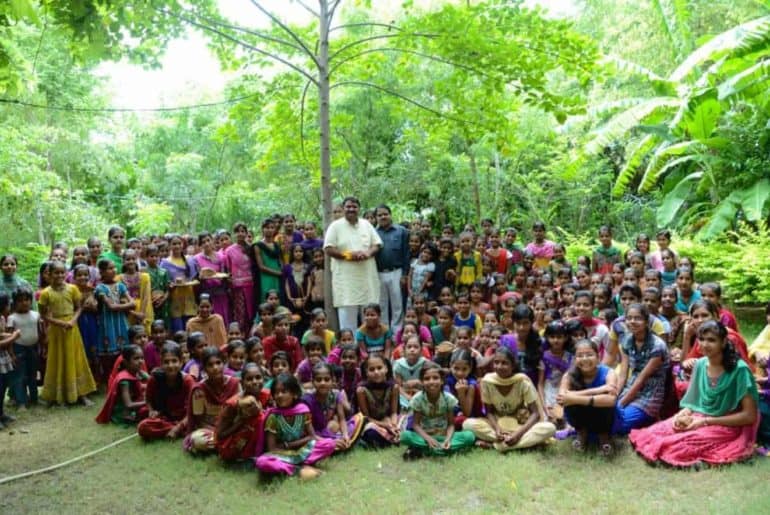After the Rajasthan Government suspended three Kota teachers over alleged involvement in religious conversion and ties to banned groups, students protested outside the SDM’s office, demanding their reinstatement.
Dozens of students from Higher Senior Secondary School in Khajuri village, Kota, Rajasthan, gathered outside the Sub-District Magistrate’s (SDM) Office on February 26, demanding the reversal of the suspension of three Muslim teachers from their school. The suspension was a result of a memorandum submitted to the education minister, Madan Dilawar by a local organization, Sarva Hindu Samaj, expressing concerns over purported religious conversion efforts and “love jihad” activities at a school within Sangod block since 2019. The memorandum additionally asserted connections between the teachers and banned groups, alleging their involvement in the reported abduction of a Hindu girl.
Dilawar, in a video statement mentioned, “We received reports that a Hindu girl’s name was changed to a Muslim name in a TC in a secondary school. There are allegations of a conspiracy involving religious conversion and ‘love jihad’ in the area. Additionally, it’s claimed that teachers compelled students to study namaaz. Upon receiving this information, we took immediate action and suspended two teachers, with an ongoing investigation into another. If found guilty after investigation, all three will face termination from their positions.”
On Thursday, the state government issued suspension orders for two teachers, Mirza Mujahid and Firoz Khan. Subsequently, on Saturday, another teacher named Shabana received a suspension order.
The action was taken against the teachers in accordance with the complaint which claimed that the former girl student, who was Hindu was mentioned as Muslim in one of the documents. The girl, after passing out from the school, had eloped with a Muslim man from the village, sparking controversy over the alleged misrepresentation of her religion by the school.
“Our teachers have not done anything”
In a recent video viral on the web, school children are seen in a conversation with the sub-divisional officer of Sangod, Rajasthan saying,
“Hamare sir pe galat aarop lagaye hai. Woh ladki khud bhaagi hai, woh khud banna chahathi hai Musalman. Ladki ne bayaan diya hai ki usne khud se likha tha Islam (on the transfer certificate),” (wrong allegations have been made against our teacher, the girl is responsible for her actions by her own choice, she wrote Islam on the transfer certificate by herself.)
She further adds on,
“Hindus and Muslim students sit, eat and play together in the school. All the accusations against our teacher are false. Our teachers have not done anything.”
The SDM then asked, “abhi aap ko kisne bheja hai yaha, (who has sent you here?) to which the students replied, “hum apni marzi se aaye hai yaha,” (we have come here by our own choice).
In another video, students are seen saying “bacchon se galat bayaan dilwaya gaya hai” (some students were forced to make false allegations against the teachers). In yet another video, a 10th-grade student, stated that he wasn’t forced to offer namaaz but was pressured to make false allegations against the three Muslim teachers in front of the media. He added that they kept reminding him of being a Hindu and instructed him on what to say in the interview. He adds and says, “These are ours, and how can I lie against them? What I am today is because of them.”
12 out of 15 teachers deny accusations
As per the reports from Maktoob Media, the principal, along with the teachers, denied the allegations made by Sarv Hindu Samaj. The Kota District Education Department requested written responses from the teachers and the school principal regarding the allegations made by the outfit.
The school principal told,
“I joined the school in 2021, and since then, I have not noticed any unusual behaviour or misconduct of the teachers who are suspended. They are teachers, and they teach their subjects very well without any bias,” he said.
The other teachers also mentioned that only educational activities are rendered in the school, and no religious activities take place.
The Quint has also accessed a copy of a letter by the non-Muslim teachers against the allegations. According to The Indian Express, the sarpanch, Sushila Kanwar, also supported and said that she had never heard of any such incident in the village.
The Vartha Bharati reports also suggest that the School Management and Development Committee (SMDC) president, Lokesh Gochar, dismissed the allegations of intentionally changing the religious column as rumours, mentioning them to be a human error in 2019 when a Hindu girl was mistakenly listed as Muslim in admission forms. “These are all rumours and baseless allegations against the three Muslim teachers. I am a frequent visitor to the school as my agriculture land adjoins it, and I never heard of or seen any such activities.” Gochar said.
“They have made false allegations against us”
As per the reports from The Quint, in one of her admission forms, Muskan, who attended the school from 2019 to 2022, found her religion listed as Islam. Upon independent verification, she confirmed it was an error. The copy of the verification by Muskan stating that it was a mistake in the form was accessed by the Quint. The teachers confirmed to the Quint that it was a single error on one form, which was rectified, while all other school documents maintain accurate information.
Mirza Mujahid, one of the suspended teachers mentions,
“Even though the police verified and looked into all of the necessary information, still they have made such false allegations against us. The case is completely different and unrelated. I never thought they would do such a thing.”
Mujahid’s brother, Muttalib Mirza told, “They have exploited that one error and alleged that she was made to change her religion back in 2019 in the school.”
Shabana, another suspended teacher, has mentioned in a letter, “Neither have I participated in any religious activity in school nor have I taught anything religious.”
Another suspended teacher, Firoz claims that he has never even met or known Muskan and mentions,
“We are innocent, we have even told them to properly look into it, investigate us if they find something is wrong. The issue has only been investigated keeping in mind one community.”
“It is certainly because of our identity”
Speaking to Maktoob Media, Firoz Khan added,
“I don’t know why we got suspended, but it is certainly because of our identity as there are only 3 Muslim teachers, and the rest 12 are non-Muslims. All the teachers and students are in our support because they also know that we all only do one thing in the school, that is teaching,”
He added, “We will follow what the department will ask and cooperate with the investigation, and if allegations get proven after it, we will accept it.”
Where are the parents?
As per the reports from The Indian Express, A source from the school, who requested anonymity, said: “The parents of the girl who eloped with the Muslim man complained to the religious group. The girl is already an adult and has refused to come back to her parents. The religion mentioned in the school register was a case of human error but the form was signed by the girl’s father. They should have been cautious too. And the girl’s religion was Hindu in all other school documents.”
The Quint reports that as per the locals, Muskan and Ali married a month ago. It was Muskan’s parents, joined by members of Bajrang Dal and VHP who levelled accusations against Mirza, Firoz and Shabana.
“Will accept punishment, if found guilty”
Maktoob Media also mentions that, another suspended teacher, Mirza Mujahid, recently discharged from the hospital due to health issues, also denied the allegations and mentions,
“These are just allegations, and we don’t know the intentions behind it. We have faith in the education department’s decision. If they have made any decision, we will abide by it.” Questioning the procedure followed by the Education Department to suspend them, he said,
“The only complaint I have with the Department is that they should have done the investigation before taking action. How can they suspend us merely based on some outsider’s allegations.”
Mujahid said “If we are found guilty, we are ready to accept any punishment.”
We are certain that the inquiry will be fair and just.” he added.
Read Also: Till the Allahabad HC Do Us Apart: Love, Law and Love-Jihad
Featured Image Source: Scroll
Dhairya Chhabra






 I recently took a trip with my college, Indraprastha College for Women, to Jodhpur and Jaisalmer, two popular tourist destinations in Rajasthan. The trip started with the blue city of Jodhpur and a visit to The Umaid Bhawan Palace. It is one of the world’s largest private residences. The Palace is divided into three functional parts – a luxury Taj Palace Hotel, the residence of the erstwhile royal family and a Museum focusing on the 20th century history of the Jodhpur Royal Family. A section of the palace showcases vintage cars owned by the royal family. The palace is picture perfect and the view stunningly beautiful. One can see the whole city from the palace since it is located at the highest point of the city.
I recently took a trip with my college, Indraprastha College for Women, to Jodhpur and Jaisalmer, two popular tourist destinations in Rajasthan. The trip started with the blue city of Jodhpur and a visit to The Umaid Bhawan Palace. It is one of the world’s largest private residences. The Palace is divided into three functional parts – a luxury Taj Palace Hotel, the residence of the erstwhile royal family and a Museum focusing on the 20th century history of the Jodhpur Royal Family. A section of the palace showcases vintage cars owned by the royal family. The palace is picture perfect and the view stunningly beautiful. One can see the whole city from the palace since it is located at the highest point of the city. the second gate. The fort is massive and every part of it has a story to tell. The carvings are incredibly intricate. The view from this fort gives a glimpse of the blue rooftops of the old city and explains why Jodhpur is called the blue city. They also have a tiny little café providing you with tasty nick nacks. The Mehrangarh Fort is one place not to miss if visiting Jodhpur. It’s a treat to all history lovers and one of the most interesting forts I’ve ever visited.
the second gate. The fort is massive and every part of it has a story to tell. The carvings are incredibly intricate. The view from this fort gives a glimpse of the blue rooftops of the old city and explains why Jodhpur is called the blue city. They also have a tiny little café providing you with tasty nick nacks. The Mehrangarh Fort is one place not to miss if visiting Jodhpur. It’s a treat to all history lovers and one of the most interesting forts I’ve ever visited. which is 300kms from Jodhpur. we stayed in the camps close to the dessert in the outskirts of the city. The first thing I noticed upon arrival is the stars, millions and millions of stars at every patch in the sky twinkling away to glory. It’s absolutely breathtaking.
which is 300kms from Jodhpur. we stayed in the camps close to the dessert in the outskirts of the city. The first thing I noticed upon arrival is the stars, millions and millions of stars at every patch in the sky twinkling away to glory. It’s absolutely breathtaking. beautiful that will engrave itself into your brain forever.
beautiful that will engrave itself into your brain forever.